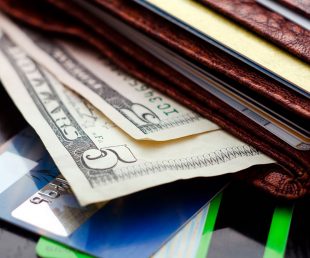Buying a car, new or used, is a financial commitment. You can make a down payment, reducing the amount you’ll have to pay monthly on the vehicle. But what if you have more pressing debt, like credit card or student loan debt?
Does it make sense to sign up for a car payment plan and use the short-term cash to pay other debts first? We’ve analyzed the pros and cons of each choice.
Why make a down payment on a car?
YOU’LL GET A BETTER DEAL ON A CAR LOAN
Let’s be honest, few of us can pay the full price of a vehicle out of pocket. If you make a down payment, you’ll still finance or borrow the remainder of the cost.
But the payment reduces your loan-to-value ratio—the amount of your loan divided by the cash value of the vehicle. A lower loan-to-value ratio often leads to better loan deals. You might get a shorter loan term, a better interest rate, or reduced monthly payments.
YOU’RE LESS LIKELY TO GO UNDERWATER
Car loan holders are considered “underwater” or “upside down” on a loan when they owe more money than the car is worth. This is also called, in less scary-sounding terms, having negative equity.
How can negative equity affect you? If the car’s stolen or totaled, or if you need to sell, you’re still on the hook for monthly loan payments. And the lower worth of the car means your insurance won’t pay enough to cover the cost. So you’re paying full price for a car you no longer have.
THE SHORTER YOUR LOAN TERM, THE BETTER
A larger down payment can score you a shorter loan term, reducing the amount of time you have to pay off the loan. Yes, this means you’ll pay more cash up front so you can save in the long run.
A short loan term is especially helpful because cars depreciate the minute you begin to drive them. The longer you’re paying down a car loan, the more your car’s value will drop. Once the car is depreciating faster than the unpaid loan balance is dropping, you’re in danger of going underwater. And your options will be more limited if you decide to trade in the car.
Plus, once your vehicle reaches a certain age it starts needing repairs. With a shorter loan term, you’ve paid off the car by the time you have to invest in keeping it running.
When you’re deciding on a loan term, think about the total price of the car rather than the monthly payments. Dealers will often calculate your potential rates by looking at the longest loan term possible, making the monthly payments seem much more affordable than they actually are.
How much of a down payment should I make?
The rule of thumb is to put down 20 percent of the value of the car. This amount is large enough to keep you from going underwater, but not large enough to make the car unaffordable.
Why should you skip a down payment or make a smaller one?
Good credit might get you a great loan deal. With stellar credit, you can often get low-interest rates and a short loan term without making much of a down payment at all. Dealers like to offer incentives, especially for new cars, and might even give you an 0 percent Annual Percentage Rate (APR) for the loan. With a deal like that, you can save the down payment cash for other debt.
You can (sometimes) find better terms from a bank or credit union. Before committing to an auto loan, try shopping for loans elsewhere. Banks and credit unions might offer more attractive terms than the dealership can give you.
Why pay off debt?
YOU’LL REDUCE YOUR DEBT-TO-INCOME RATIO
Debt-to-income ratio (DTI) is just what it sounds like—the total money you owe for debt repayment compared to your pre-tax or gross income. Lenders look at your DTI before issuing any type of loan. The faster you can pay down debt, the better off you’ll be when making other financial commitments.
LESS DEBT MEANS A MORE AFFORDABLE CAR
Less overall debt makes the car more affordable. Car lenders consider your DTI too. They’ll pull your FICO Auto Score, a type of credit score that looks at your ability to pay off previous installment-type loans. The FICO Auto Score looks specifically at car loans, but other types of debt factor in too. The score affects your interest rate, your loan term, and whether or not you can get a loan at all.
If you’re thinking about buying a second car, it makes sense to pay down debt on your current vehicle and improve your score.
Not to mention, timely payments to other creditors boost any credit score you’re likely to get, meaning better terms when it’s time to buy a car.
How do I pay off debt?
Fortunately, you can make any amount of debt more manageable.
DEBT CONSOLIDATION LOANS
Debt consolidation loans are effective solutions for moderate amounts of credit card debt.
BALANCE TRANSFER CREDIT CARDS
Balance transfers shift your debt to a lower-interest credit card. They’re ideal for someone who already has solid credit but wants to consolidate what they owe.
REVIEW STUDENT LOAN PAYMENTS
Student loan payment plans come with options for every financial situation. You can choose to consolidate, refinance, put a loan in deferment, prioritize which loan to pay off first, and more.
Why skip paying off debt?
BUDGET FOR THE CAR’S EXTRA COSTS
Cars can get pricey. Besides the cost of the vehicle, you’ll pay taxes and fees in most states. Add the cost of gas, oil changes, parking, and possible interest on monthly payments, and you’re looking at a significant long-term expense.
A down payment eases the burden of monthly installments, often making the car cheaper in the long run (and avoiding even more debt).
MAKE UP FOR A POOR OR NONEXISTENT CREDIT HISTORY
Car buyers with spotty credit or no credit at all will likely have to put more money down on a vehicle. You may have to skip paying off other debt to get a car.
But this expense can be a blessing in disguise. Not only does the down payment reduce the remaining car loan, it helps keep the car from going underwater. If your cash flow situation changes and you need to sell the car, you’ll be in much better shape if you’ve made a down payment. And the money you save can go towards other debts as needed.
Which should you choose?
MAKE A DOWN PAYMENT IF:
- You have average, fair, or poor credit.
- Your existing debts are minor or less burdensome than a large car loan would be.
- You’re concerned about your ability to make monthly car payments.
PAY OFF DEBT IF:
- You can get better interest rates on a car loan than you can on your existing debts.
- You’re able to put off a car purchase until you’ve saved a little more.
- You have great credit and a ton of auto loan options.
Summary
The best car financing plan will be different for everyone, but you can find a method that works for you. Just don’t forget the financial big picture.
This article was written by Amy Bergen from Money Under 30 and was legally licensed through the NewsCred publisher network. Please direct all licensing questions to legal@newscred.com. Please direct all licensing questions to legal@newscred.com. Santander Bank does not provide financial, tax or legal advice and the information contained in this article does not constitute tax, legal or financial advice. Santander Bank does not make any claims, promises or guarantees about the accuracy, completeness, or adequacy of the information contained in this article. Readers should consult their own attorneys or other tax advisors regarding any financial strategies mentioned in this article. These materials are for informational purposes only and do not necessarily reflect the views or endorsement of Santander Bank.
![]()


